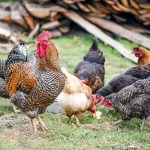Winter can have a significant impact on egg production in chickens. The shorter days and colder temperatures can cause hens to decrease or even stop laying eggs altogether. This is because chickens rely on daylight to stimulate the production of eggs, and the shorter days of winter can disrupt their natural egg-laying cycle. Additionally, the cold weather can cause stress on the birds, which can also affect their egg production. It’s important for chicken owners to understand these factors and take steps to mitigate their impact on egg production during the winter months.
In addition to the environmental factors, it’s also important to consider the age and breed of your chickens when understanding the impact of winter on egg production. Older hens may naturally produce fewer eggs, and certain breeds may be more or less affected by the cold weather. By understanding these factors, chicken owners can better prepare for and manage their flock’s egg production during the winter.
Table of Contents
- 1 Creating a Cozy and Comfortable Environment for Your Chickens
- 2 Adjusting Your Chickens’ Diet for Winter Egg Production
- 3 Providing Adequate Lighting for Your Chickens
- 4 Implementing a Regular Cleaning and Maintenance Routine
- 5 Monitoring Your Chickens’ Health and Well-being During the Winter
- 6 Tips for Managing Your Flock’s Egg Production in the Winter
Creating a Cozy and Comfortable Environment for Your Chickens
Creating a cozy and comfortable environment for your chickens is essential for maintaining egg production during the winter months. This includes providing adequate shelter from the cold, wind, and precipitation, as well as ensuring that the coop is well-insulated to retain heat. Adding extra bedding and straw to the coop can also help keep the chickens warm and comfortable during the colder months. Additionally, providing perches and roosts for the chickens to huddle together can help them stay warm and reduce stress.
It’s also important to ensure that the coop is well-ventilated to prevent moisture buildup, which can lead to respiratory issues in chickens. Proper ventilation will help maintain a healthy environment for the birds and support their overall well-being during the winter. By creating a cozy and comfortable environment for your chickens, you can help them stay healthy and maintain their egg production throughout the winter months.
Adjusting Your Chickens’ Diet for Winter Egg Production
Adjusting your chickens’ diet is another important factor in maintaining egg production during the winter. In colder weather, chickens require more energy to stay warm, so it’s important to provide them with a balanced diet that meets their nutritional needs. This may include increasing their protein intake to support egg production and providing additional sources of energy, such as grains and seeds.
In addition to adjusting their diet, it’s also important to ensure that your chickens have access to fresh, clean water at all times. In colder temperatures, water sources can freeze, so it’s important to regularly check and replace frozen water to prevent dehydration in the birds. By adjusting your chickens’ diet and ensuring they have access to fresh water, you can support their overall health and egg production during the winter months.
Providing Adequate Lighting for Your Chickens
Providing adequate lighting for your chickens is essential for maintaining egg production during the winter months. As mentioned earlier, chickens rely on daylight to stimulate the production of eggs, so it’s important to supplement their natural light exposure with artificial lighting. This can be achieved by installing a timer-controlled light in the coop that extends the birds’ exposure to light in the early morning and evening hours.
It’s important to provide a gradual increase in light exposure rather than sudden changes, as this can cause stress on the birds. By providing adequate lighting for your chickens, you can help maintain their natural egg-laying cycle and support consistent egg production throughout the winter.
Implementing a Regular Cleaning and Maintenance Routine
Implementing a regular cleaning and maintenance routine is crucial for supporting your flock’s health and well-being during the winter months. This includes regularly cleaning the coop, removing soiled bedding, and ensuring that the environment is free from pests and parasites. It’s also important to regularly inspect the coop for any signs of damage or wear and tear, as well as ensuring that all doors and windows are properly sealed to prevent drafts.
In addition to regular cleaning, it’s important to provide enrichment activities for your chickens to keep them active and engaged during the winter months. This can include providing them with toys, treats, and opportunities for exercise to prevent boredom and reduce stress. By implementing a regular cleaning and maintenance routine, you can create a healthy and comfortable environment for your chickens and support their overall well-being during the winter.
Monitoring Your Chickens’ Health and Well-being During the Winter
Monitoring your chickens’ health and well-being is essential for identifying any potential issues that may affect their egg production during the winter months. This includes regularly checking for signs of illness or injury, as well as monitoring their behavior and egg production. It’s important to be proactive in addressing any health concerns that arise, as early intervention can prevent more serious issues from developing.
In addition to monitoring their physical health, it’s also important to pay attention to their emotional well-being. Chickens are social animals and can experience stress and anxiety, especially during the colder months when they may be confined to the coop more often. Providing opportunities for social interaction, as well as ensuring that they have access to a comfortable environment, can help support their emotional well-being during the winter.
Tips for Managing Your Flock’s Egg Production in the Winter
In addition to the aforementioned strategies, there are several tips for managing your flock’s egg production during the winter months. This includes providing supplemental heat in the coop if necessary, as well as using insulation to retain heat. It’s also important to regularly check for signs of frostbite on the birds’ combs and wattles, as well as providing them with additional protection from extreme cold temperatures.
Another tip is to consider adding new hens to your flock in the fall, as younger birds are more likely to continue laying eggs throughout the winter months. Additionally, providing a balanced diet with plenty of protein and energy sources can help support consistent egg production in your flock.
Overall, managing egg production in chickens during the winter requires careful attention to their environment, diet, lighting, and overall well-being. By implementing these strategies and tips, chicken owners can support their flock’s health and maintain consistent egg production throughout the colder months.
Meet Walter, the feathered-friend fanatic of Florida! Nestled in the sunshine state, Walter struts through life with his feathered companions, clucking his way to happiness. With a coop that’s fancier than a five-star hotel, he’s the Don Juan of the chicken world. When he’s not teaching his hens to do the cha-cha, you’ll find him in a heated debate with his prized rooster, Sir Clucks-a-Lot. Walter’s poultry passion is no yolk; he’s the sunny-side-up guy you never knew you needed in your flock of friends!







